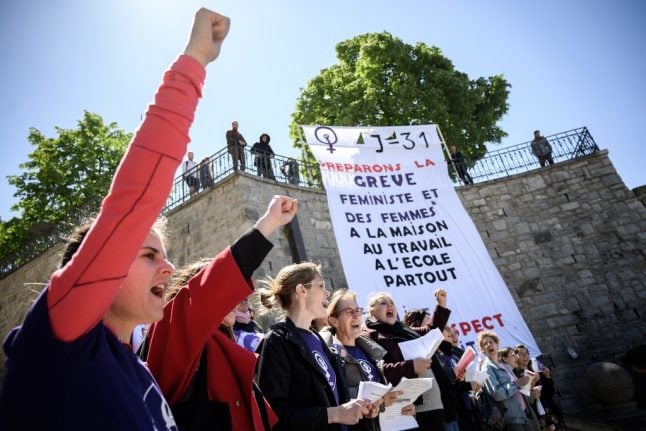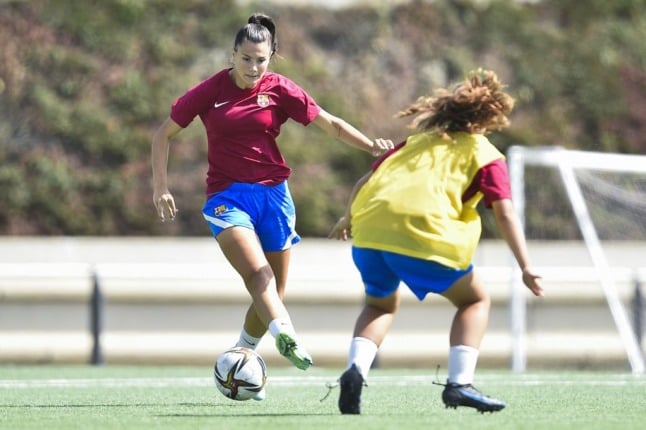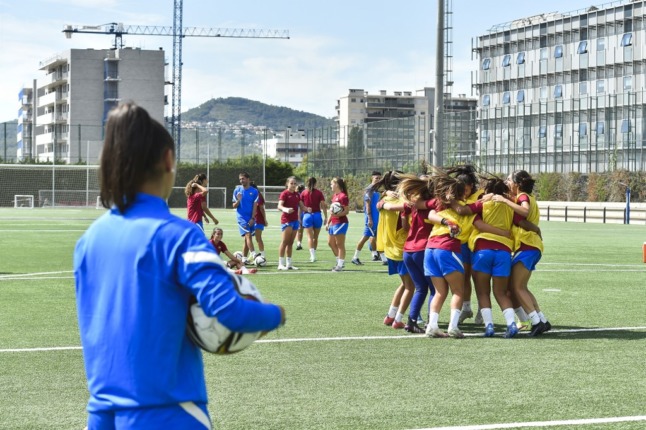
GENDER EQUALITY
‘We want to block the country’: Women in Switzerland to march for equal pay
Women across Switzerland are set to walk off the job and into the streets Friday to demand wage parity, nearly three decades after staging the country's first nationwide strike for equal pay.
Published: 14 June 2019 09:25 CEST

Women demonstrate during an event on May 14th in Lausanne, one month prior to a nationwide women's strike on June 14th. Photo: Fabrice COFFRINI / AFP
Events planned throughout the day range from pram marches, to whistleconcerts, to extended lunch breaks and giant picnics, with huge demonstrationsplanned Friday evening in several cities, including in front of the government in Bern.
Unions and rights groups organising the events are hoping to see a sea of purple — the colour chosen to show solidarity with the cause — but in a country where work stoppages are extremely rare the turnout remains uncertain.
On June 14, 1991 — 10 years after equality between the sexes was enshrined in the Swiss constitution — half a million women walked out of their workplaces or homes to protest persistent inequalities.
Three decades on, however, the organisers of Friday's events say things have barely improved, insisting women need to demand “more time, more money, more respect”.
Women in Switzerland on average still earn 20 percent less than men.
And for men and women with equal qualifications, the wage gap remains nearly eight percent, according to the national statistics office.

A woman wearing a t-shirt advocating women's rights demonstrates during an event on May 14th. Photo: Fabrice COFFRINI / AFP
Riding the wave of the global #MeToo movement, a new generation of women is attacking the lingering issues of discrimination, harassment and wage inequality with renewed vigour.
Organisers have called upon women to snub their jobs, and also housework, for the entire day to help raise awareness about the vital contribution women make across society.
“Really, the objective is to block the country with a feminist strike, a women's strike,” activist Marie Metrailler told AFP recently.
Strikers will also be demanding zero tolerance for violence against women and more respect and better pay for women's work, including through the introduction of a minimum national salary.
In some towns, nurseries will be closed, while schools will ensure only minimum service to allow the mainly women staff and teachers to take part in the day's events.
'Women work for free'
For those women unable to take a full day, the organisers urge them to at least pack their things and leave by 3:24 pm.
“After that, women work for free,” said Anne Fritz, the main organiser of the strike and a representative of USS, an umbrella organisation that groups 16 Swiss unions.
Back in 1991, around 500,000 women — a high number in a country that at the time counted fewer than 3.5 million female inhabitants — marched and organised giant picnics in the streets.
The large turnout was all the more remarkable given that work stoppages have been extremely rare in Switzerland since employers and unions signed the “Peace at Work” convention in 1937. It states that differences should be worked out through negotiation rather than strikes.
Back then, many women were blocked from participating in the strike, andorganisers fear a repeat Friday, with the country's main employers' organisation flatly opposed to the action.
But according to a recent poll by the Tamedia group, a full 63.5 percent of Swiss residents back the strike.
A number of politicians have also voiced their support, and parliament has meanwhile decided to mark the occasion with a 15-minute break.
The idea of another nationwide women's strike was born out of frustration at a bid to change the law to impose more oversight over salary distribution, which passed through the Swiss parliament last year.
The final text only applied to companies with more than 100 employees — affecting fewer than one percent of employers — and failed to include sanctions for those that allow persistent gender pay gaps.
Gaining recognition of women's rights has been a drawn-out process in Switzerland, which was one of the last countries in Europe to grant women the right to vote, in 1971.
By Agnès Pedrero/AFP
Url copied to clipboard!




 Please whitelist us to continue reading.
Please whitelist us to continue reading.
Member comments